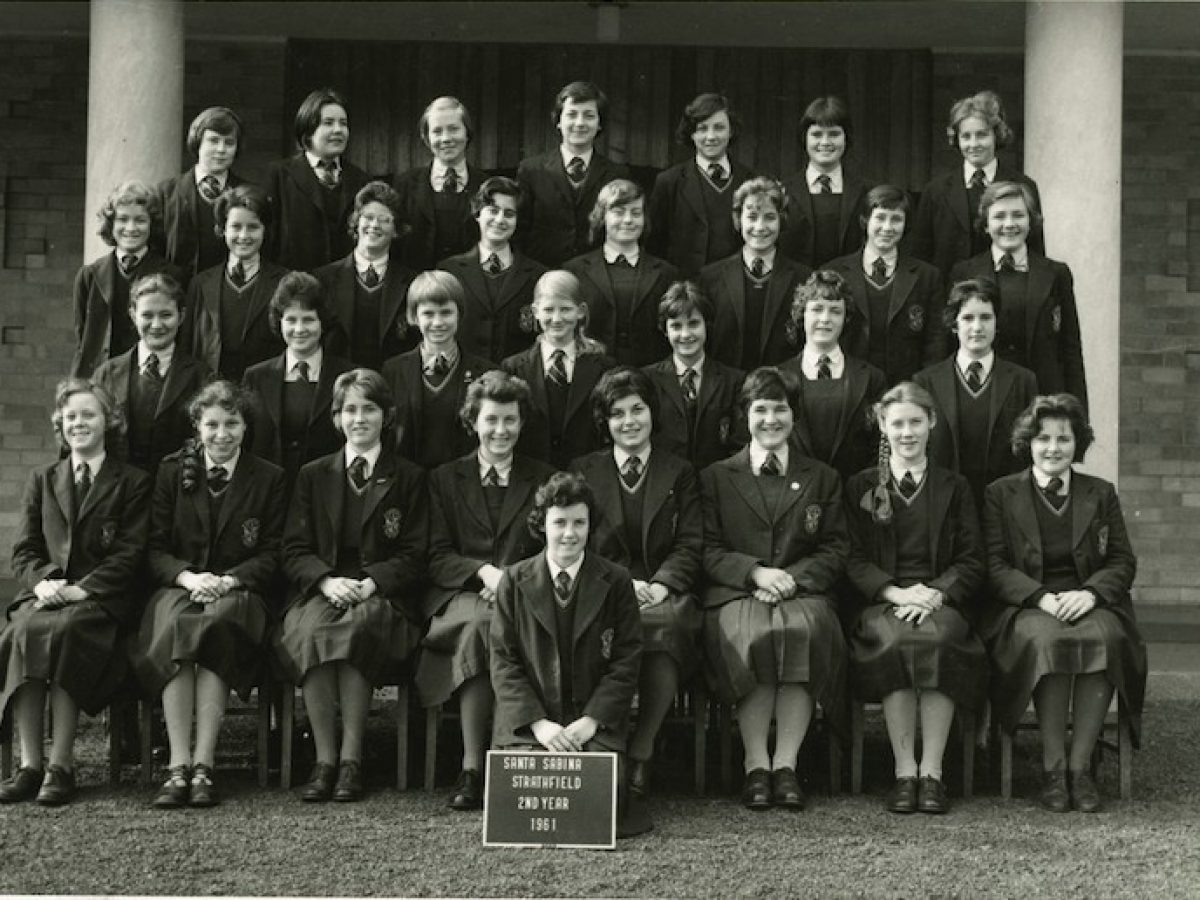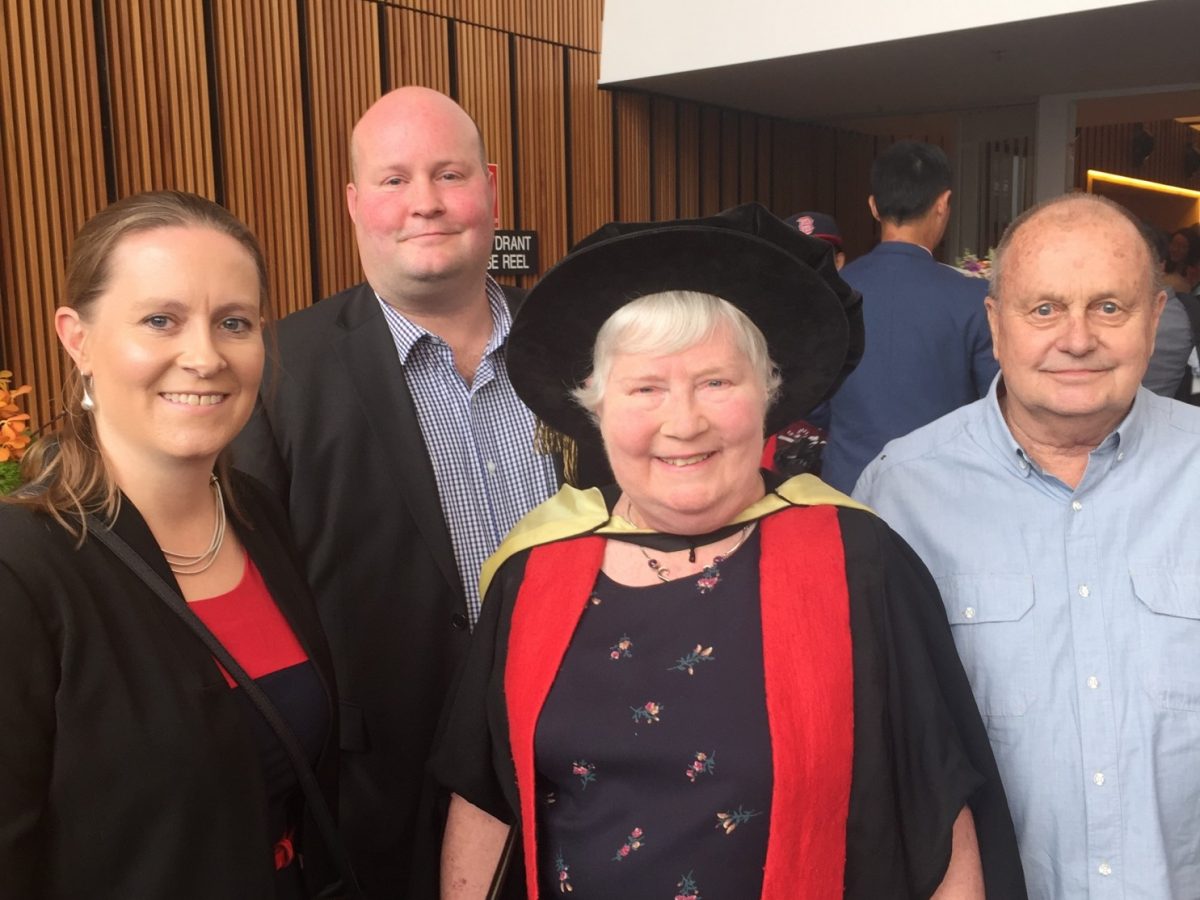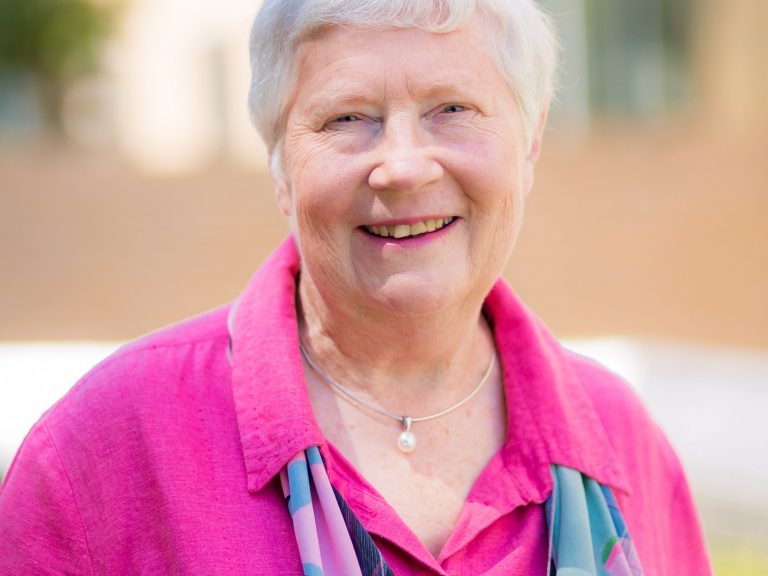Emeritus Professor Jenny Edwards PhD, MSc, BSc (Hons) is a first generation IT educator, champion of women in computing and was dux of Santa Sabina College in 1964. Entering the University of Sydney in 1965 from Santa Sabina as an undergraduate studying science, Jenny went on to hold university teaching positions in computer science as well as working in industry consulting locally and overseas.
In April 2020, Jenny connected with Santa Sabina College via video-conference to answer questions about her innovative career and offer insights for the next generation of young women pursuing careers in STEM. Read on to learn more about her pioneering work and why she is optimistic about opportunities for Santa students of the 2020s, even in the new world of COVID-19.
What was it like as a woman studying science in the 1960s? What challenges did you face?
In my honours maths course [part of the Bachelor of Science degree at Sydney University] the students were 600 men and three women. All three of us then became professors! I had come from Santa which was all female and I did not have any brothers and had to scramble to find someone to take to the formal…but it wasn’t a problem for me – I had heaps of friends, mostly guys, and it was fine.
What was the spark for your career in IT and in academia?
When I was nine [1956] my father took us to a Sydney University open day. They had just built their computer SILLIAC and I played noughts and crosses against it and I won – I thought that was pretty good. Also at Del Monte on my desk there was this grafitti: e(ip) = -1 so I was determined that when I grew up I would find out why e(ip) = -1. I was just always really quite technical.
At the end of 6th class I was supposed to go to my mother’s old school but Santa had a much better reputation for maths and science so I stayed where I was. I knew people at other very good schools but they didn’t have the same sort of maths and science that I had [at Santa]. Most of my family were doctors but that didn’t inspire me at all. When I arrived at uni they hadn’t started teaching computing although they did have SILLIAC. I joined the maths society which ran some short courses in computing. Formal teaching of computing started a bit later, for me in 3rd year [1967]. I went on to do a Master’s and PhD, both specialising in computing. By the way, the calculations for building the Snowy Mountain Scheme were all done on SILLIAC, a machine of just 1K memory.
Tell us about your international experience – where did you go and how useful was it?
I worked internationally in my postgrad work and I did much consulting in industry. I discovered I really enjoyed teaching so I moved into academia. IT really is a community of scholars worldwide. I was really lucky my Head of Department Professor John Bennett [Australia’s first professor of computer science] was a computing pioneer who knew international computing experts and invited them in. I’m still good friends with them – some now in their 90s! I went to international conferences, worked at London School of Economics, was appointed Senior Visiting Research Fellow at IBM research labs in the US, and worked in a high performance computing centre in Barcelona although I was not ever formally employed overseas.
Do you think international experience for young career scientists is going to change now because of COVID-19?
One of the interesting things about IT is it really is a global industry – even people here in Australia are in international teams. The challenges include different cultures, time zones and language issues but despite these, most people in IT find themselves in an international environment anyway and overseas experience is a very big plus.
Our students in Year 12 are nervous about the particular challenges of doing the HSC and IBDP in 2020, such a difficult year – what advice can you give them?
The most important thing is that Year 12 results are not the ‘be all and end all’. What really matters is what you do with life afterwards. Of course if you do really well in Year 12 that gives you more options but even if you don’t do really well you should go and do something else and think about what you really want to do. I think doing a gap year is absolutely fabulous. We could really tell with our 1st year students who’d had a gap year – it gives people a chance to think, ‘is this course really what I want to do?’ Don’t stress if you don’t get into the course you want – take a gap year or enrol in something else that would be useful.
How is COVID-19 changing the realm of IT?
It has created many more jobs! For companies like Zoom, Google and Apple their sales have skyrocketed. Even in normal work environments employers need systems and security staff to deal with people working from home – a secure environment needs setting up. The pandemic is really creating jobs and opportunities if people want to seize them. Even bookshops are now going online and organising deliveries – most of them wouldn’t have had that sort of set up before now. All sorts of little businesses need more IT help. In the long run the pandemic might even be good for business if new ideas carry on post COVID. It’s not like Spanish flu which was just as ghastly in terms of lives lost but we didn’t have the technology then.
How do you spend your days now?
Mostly what I do now is Australian accreditation work and reviews of university departments. Computing courses are accredited by the Australian Computing Society and they have to be reviewed externally every five to seven years. As an experienced academic I also do government quality assurance work. I developed a major eye problem preventing me from continuing to work as an academic but the accreditations are something I can still manage.
What do you miss most from your academic life?
The students, particularly research students and helping them with their theses. I really loved being in the classroom. For one of my students I organised an internship for her at a research lab in US. She then became known in Canada and ended up as a professor at a very young age.
What have you enjoyed most about your career?
You get to meet lots of great people within the university and within industry and overseas at conferences and on sabbatical. I’m still good friends with many after 50 years! I have so enjoyed all of the people from my career, not just the students.
How did you juggle marriage and children with academic success?
I married late, established my career and when I had little kids all I took was six weeks’ maternity leave then took the kids to childcare at work. It wasn’t easy and not a lot of housework got done! Nor did I manage a lot of research when the kids were little. My husband was very supportive, I think that makes a big difference. Flexible work is one of the the attractions of academia and this is also something that will come out of COVID – people’s work lives will change because many work places now realise how productivity grows away from meetings. Workplaces might free up a bit. Homeschooling is a bit much on top of everything else but everyone I know loves saving on commuting every day and that’s time you can spend on work or on yourself and that in turn makes you better able to cope.
When you think about your time at Santa Sabina what experiences come to mind?
It was very friendly. I was an outright nerd and hopeless at sport. I’ve never had good eyesight and we used to play softball on a field and down the bottom of the field was Buttercup Lane. I used to sit in the lane and read a maths book – if a ball came near it was my job to chuck it back. Every now and then we’d have a substitute teacher who’d ask why I wasn’t on the team. The girls would say ‘she’s hopeless and anyway it’s much more important that she does well in maths’. So the girls thought I was weird but supported me. I’m still in touch with my Santa friends. The Dominican ethos in terms of education meant it was taken for granted that we’d all go on and do something after school. We were all encouraged and many went off and did many interesting things.

Was there one stand out staff member who really made a mark on you?
A couple actually: Sr Julie (Sr Diana Woods OP) for Latin was great, Sr Mary Joseph for maths, Sr Genevieve for science and Sr Reginal (Sr Mary Britt OP) for Latin. I’ve been forever grateful for the Latin I had at Santa because it’s given me a lot of insight into English and into language. It appeals to my mathematical and structured mind.
Your research interests include mathematical programming and algorithms for parallel processing – can you explain this to a non-scientist?
I work on very large problems, with millions of variables. A single computer can’t do much with these sorts of problems so you split the problem up into little bits and you get parallel computers to work on each bit then put them all back together. I did a major problem with IBM research labs for American Airlines: hundreds of planes, different routes, crew members with restrictions on hours and breaks and needing time at home. Actually planning how to put what staff on what plane flying where, 24/7, is a big problem. Then there was Arnotts Biscuits with factories in every state – in some states the biscuits were Kosher and others not, chocolate biscuits were no good in Queensland but great in Tasmania. Ovens came in different sizes and not all of them could make SAOs…I had to solve what biscuits could be made where to minimise biscuit travel across Australia.
What do you consider to be essential school learning for a girl in the 2020s?
Communications skills – not just writing but being able to stand up and give presentations including ‘the elevator pitch’. You need to learn how to say things succinctly – debating is very good practice for that. Regardless of where you want to end up some form of maths or logic is important. Not necessarily algebra or calculus but you have to have a feel for numbers. I’m a great believer in doing what you’re passionate about. I know that people worry about getting a job but they should do a first degree in what they really love then a Master’s in something that might actually pay the bills. I just think people will be happier that way. You have to live your life ideally doing things that you really enjoy. I’ve been very lucky, I really enjoyed my career. I’m horrified at so many students who start a degree and only go one semester then decide it’s not for them. There’s a lot of time in Year 11 and 12 to go to uni open days. The other thing is not to spend your whole time studying – extracurricular activities are something employers pay an enormous amount of attention to. If you take time out from study for a weekly game of tennis or orchestra you’ll get back to your studies happier and will do better. Time out is really valuable.
Where does Australia sit in worldwide IT?
Hmmm…the NBN hasn’t done us any favours. We’re behind in connectivity. That’s a problem because in the country connectivity is incredibly important as it’s an absolute lifeline. I think other countries have much better internet and connectivity than we do. But we have some excellent unis and top people in their fields. It’s a global industry and many of our students are in great demand overseas or they’re well-respected here. We do reasonably well in terms of staff, we don’t do so well in terms of infrastructure.
How do you feel about staying engaged with Santa Sabina?
I love what I call the golden oldies [Golden Girls and Boys Reunion] – the 50 year celebration is a wonderful thing. People so enjoy it and I knew quite a lot of students and it’s lovely to see many of those people. I like giving back – I had a very good education and I am forever grateful. I sent my daughter to Santa [Cathy Edwards-Davis, Class of 1996, an engineer and Director of Infrastructure at Inner West Council] and she did well too. I meet ex-students from time to time of different ages and I am normally very impressed by them. I guess it’s just a bit of giving back and catching up with old friends. Many of the nuns who are still around are the ones I particularly valued at school. Many of them had a major effect on us and many of us want to respect and honour that.
When Jenny gave the Address at the UTS Business Graduation Ceremony in April 2016 she said,
‘Friends come and go, but with a precious few you should hold on because the older you get, the more you need the people who knew you when you were young. Life is not about warming yourself by the fire, life is about building the fire. And generosity is the match…’
Jenny’s generous acknowledgement of her gratitude to Santa Sabina and her ‘giving back’ is in more ways than one. We thank her for all of it, especially her inspiration.




